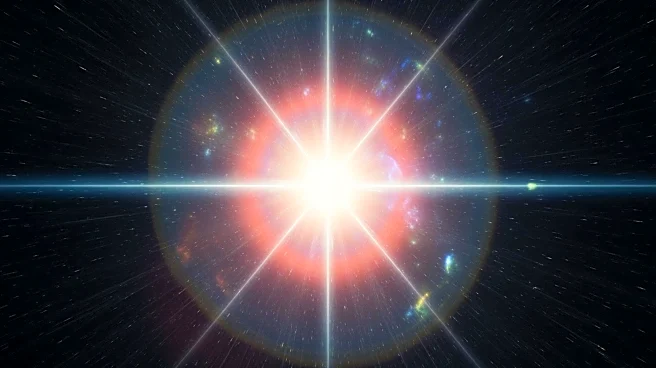What's Happening?
The article from Big Think delves into the complexities surrounding the temperature of the hot Big Bang, a pivotal event in cosmology that marked the beginning of the universe's expansion. Despite extensive
research, scientists have yet to determine the exact temperature of the Big Bang's earliest stages. The cosmic microwave background (CMB) provides clues, indicating that the universe was not as hot as the Planck scale, which would have left distinct signatures in the CMB. Instead, the CMB suggests an inflationary past followed by a less hot, dense state. This has led to the development of various inflationary models, each predicting different outcomes for the universe's early temperature and structure. The article highlights the ongoing quest to understand these initial conditions and the role of inflation in shaping the universe.
Why It's Important?
Understanding the temperature of the hot Big Bang is crucial for cosmologists as it influences theories about the universe's formation and evolution. The temperature impacts the types of particles and structures that could form in the early universe, affecting everything from the formation of atomic nuclei to the development of galaxies. Accurate models of inflation and the Big Bang can help scientists predict the universe's behavior and its future. This research has broader implications for fields like particle physics and cosmology, potentially guiding future experiments and observations. The quest to pinpoint the Big Bang's temperature also underscores the challenges in reconciling theoretical predictions with observational data, a fundamental aspect of scientific inquiry.
What's Next?
Future research aims to refine inflationary models and improve measurements of the CMB's polarization, which could provide more precise constraints on the universe's early temperature. Scientists are also exploring the gravitational wave spectrum predicted by inflation, which could offer insights into the tensor-to-scalar ratio, a key parameter in understanding the universe's initial conditions. Upcoming experiments and observations, such as those from advanced telescopes and detectors, are expected to shed light on these aspects, potentially leading to breakthroughs in cosmology. The ongoing search for B-mode polarization signals in the CMB remains a priority, as detecting these signals would significantly enhance our understanding of the universe's origins.
Beyond the Headlines
The exploration of the hot Big Bang's temperature touches on deeper philosophical questions about the nature of the universe and our place within it. It challenges scientists to consider the limits of human knowledge and the potential for new discoveries that could reshape our understanding of cosmology. The study of inflation and the Big Bang also raises ethical considerations regarding the allocation of resources for scientific research and the pursuit of knowledge for its own sake. As scientists continue to probe the universe's beginnings, they must navigate the balance between theoretical exploration and practical application, ensuring that their findings contribute meaningfully to both scientific advancement and societal progress.









